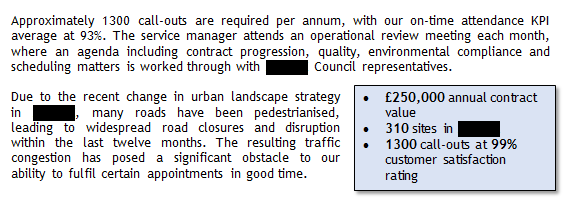Article Details
It can be easy to dive head first into a tender document for a variety of reasons: you need to get the bid finished and off your desk, you have a day job to complete, or you are working to tight deadlines — the list could go on.
The planning stage in the bidding process is often overlooked, even though this is a vital contributor to your overall success. It includes understanding the specification for a tender fully, and using it to structure your narrative responses to gain you the most marks available. Do not forget — tendering is a competition!
We provide our top tips for using the tender specification when writing a bid, ensuring that you are not only eligible to bid, but able to put together a winning tender document to the contracting authority.
Pass/fail
One of the first elements to consider in the tender specification is any pass/fail areas. These specific areas are requirements that you must meet, in order to be considered for the contract. They will not score you any additional marks, but they are a necessary bidding requirement.
The most common areas included in the pass/fail questions are:
- Turnover requirements
- Insurances
- Certifications e.g. ISO, Investors in People
- Memberships e.g. CQC, CHAS, Constructionline
- Ensuring that you can deliver 100% of the scope of works outlined in the specification.
Before you start writing any of your tender responses, evaluating the pass/fail requirements in the specification should be your first port of call. If you meet all of the requirements, then you are good to go with putting together your tender submission.
Contract examples and case studies
In our experience, contract examples and case studies are often areas where companies lose marks as they are not fully tailoring their examples to meet the specification, and in some cases are not providing the correct number of examples at all.
If a tender asks for three contract examples or case studies, you must provide evidence of three similar contracts which best showcase your abilities, competences and strengthens as a company. Providing only two examples could lose you marks or even count as a fail in some submissions.
This is a great opportunity to score high marks and elaborate on past work, proving to the contracting authority that you have the existing expertise and experience to deliver the contract better than your competition. Many companies do not fully use contract examples or case studies to their advantage and lose easy marks in this section of their tender response.
Evidence, evidence, evidence!
Alongside your case studies and examples, there is the need for evidence throughout the quality section of your tender response. Use the specification and evaluation criteria to guide the structure of your bid, so that you do not miss out any vital areas on which you will be scored. Take this a step further, then provide evidence to strengthen the points you have made.
It is not enough to say that you have successfully delivered call-outs to clients: how many? Who to? What was the outcome and satisfaction rate? Including as many statistics, facts and figures as possible to back up your response will score highly with the evaluator and allows you to showcase the work your company has done. Essentially, blow your own trumpet!

Exceeding expectations
As well as hitting all the main points in the specification and evaluation criteria, go above and beyond this to show added value. This can be done through further research, including new innovations and additional mechanisms other than those outlined in the specification. This will give your firm the competitive advantage against those bidders who have included just the bare minimum to get by — if it is a highly competitive bid (which many are) this will be essential to score the most marks and win the contract.
Putting yourself in the evaluator’s shoes when writing, and reviewing, your tender submission is a good way to check that you have fully met the specification; you could even have a go at marking your responses against the criteria outlined to see if there are any areas you can improve on. If you are struggling to do this, why not take advantage of our external review service? One of our experienced bid writers will critique your completed tender submission and ensure that it fully answers the specification and covers all the evaluation criteria.